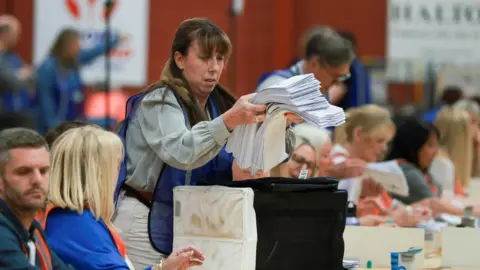**Seven Key Insights from the Recent Election Results**
The recent election results have been a captivating spectacle, revealing important trends across various contests in England. While the counting of votes is still ongoing, several vital lessons have emerged that provide a clearer picture of the political landscape. Below, we examine seven critical insights gleaned from these elections that highlight shifting alliances and sentiments among voters.
**1. A Disheartening Outcome for Labour**
Clearly, the Labour Party finds itself grappling with disappointing results. This election serves as the party’s first significant test since sweeping to power ten months ago with an overwhelming victory. At that time, Prime Minister Keir Starmer’s jubilant proclamation, “We did it!” echoed throughout the party ranks. However, in the wake of these elections, Labour’s once high spirits seem deflated.
The heart-wrenching loss in a by-election for Runcorn and Helsby, marked by a mere six-vote margin, has left Labour campaigners not only disappointed but profoundly concerned about the party’s standing with the electorate. Despite narrowly missing out, the writing is on the wall as Labour seems to be experiencing a steep decline in goodwill as they grapple with expectations versus reality. Starmer’s once decisive victory was built on thin margins that are increasingly becoming evident in this testing phase.
**2. Labour Faces Internal Debates on Future Directions**
In the aftermath of the elections, the Labour Party is faced with crucial debates regarding its future strategies. A recurring theme among Labour representatives has been the government’s decision to means-test winter fuel allowances, which has not sat well with many voters. This central issue appears to resonate deeply as observed during campaign interactions on the ground.
Some political figures within Labour are adamant that this decision marks a significant miscalculation. While some argue for better communication regarding these cuts, others assert that reversing such decisions may be necessary to restore trust. The consensus, however, is that finding an effective response is essential for Labour to mitigate the damage sustained and enhance public perception heading into future elections.
**3. The Conservative Party’s Woes Continue**
The Conservatives, under the leadership of Kemi Badenoch, seem to spiral deeper into crisis, experiencing their worst electoral outcomes in modern history. With historical strongholds like Staffordshire and Lincolnshire now slipping away, the reality is increasingly grim. Many within the party feel that Labour’s current struggles could provide a lifeline, but skepticism remains high.
The pressing question remains whether there is genuine appetite within Conservative ranks to seek new leadership or revise strategies. The recent elections have underscored the party’s struggle for relevance amid their historical losses as they fight to regain voter trust.
**4. Reform’s Rise Brings New Responsibilities**
Nigel Farage’s Reform UK has shown an undeniable surge in political strength, akin to past successes with Ukip and the Brexit Party. With victories now at the local council level, the party faces an essential shift from merely critiquing the existing political framework to delivering tangible improvements in governance. This new challenge will test the party’s effectiveness in fulfilling voter expectations and retaining its newfound popularity.
**5. Gains for the Liberal Democrats and the Greens**
The Liberal Democrats have made notable strides in previously Conservative-held constituencies, capturing council seats and establishing themselves as a viable alternative. Meanwhile, the Greens have shown signs of growth, even if they faced disappointments in more substantial contests. The rise in support for these parties exemplifies the shifting preferences of voters dissatisfied with the traditional party structures.
**6. Voter Demand for Change**
The overarching sentiment shared across party lines is a call for change — a message encapsulated in the very core of Labour’s previous campaign strategies. Today, political actors must navigate these waters carefully to capitalize on this collective desire for improvement and message resonance among the electorate.
**7. A Fragmented Political Landscape Emerges**
The historical two-party system appears to be increasingly strained. The results suggest a future where political contests could frequently result in razor-thin margins and necessitate cooperation and compromise between various smaller parties. With volatility also looming large, the political environment is unpredictable as parties vie for voter attention in the face of evolving dynamics.
In conclusion, these elections have not only laid bare the vulnerabilities of the main parties but also revealed the potential for new players to emerge on the political chessboard. As discussions evolve and strategies are reassessed, the future remains uncertain yet full of possibilities. Understanding these developments will be essential for anyone looking to grasp the nuances of British political life in the coming years.



